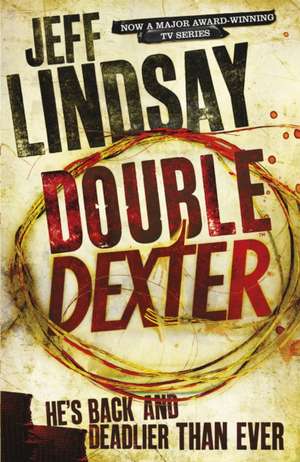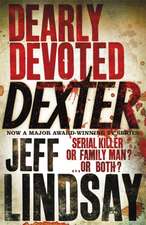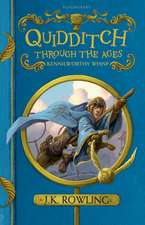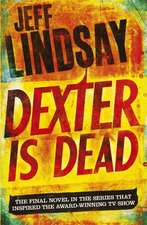Double Dexter
Autor Jeff Lindsayen Limba Engleză Paperback – 30 aug 2012
Everyone's favourite serial killer is back and deadlier than ever... 'Dexter has a way of getting under your skin. Wicked stuff' GUARDIANA witness.
Such a simple concept - and yet for Dexter Morgan, a perfectly well-disguised serial killer, the possibility of a witness is terrifying. As an upstanding blood-spatter analyst for the Miami Police, Dexter has always managed to keep the darker side of his life out of the spotlight. An expert at finding truly bad people - murderers who've long escaped justice - Dexter has long been giving them his own special brand of attention.
But now someone has seen him in the act. Dexter is being followed, manipulated and mimicked, leading him to realise that no one likes to have a double - especially when his double's goal is to kill him. Dexter is not one to tolerate such displeasure ...
in fact, he has a knack for extricating himself from trouble in his own pleasurable way.
| Toate formatele și edițiile | Preț | Express |
|---|---|---|
| Paperback (2) | 54.65 lei 3-5 săpt. | +29.00 lei 7-13 zile |
| Orion Publishing Group – 30 aug 2012 | 54.65 lei 3-5 săpt. | +29.00 lei 7-13 zile |
| VINTAGE BOOKS – 31 mai 2012 | 107.92 lei 3-5 săpt. |
Preț: 54.65 lei
Preț vechi: 70.68 lei
-23% Nou
10.46€ • 10.85$ • 8.74£
Carte disponibilă
Livrare economică 22 februarie-08 martie
Livrare express 08-14 februarie pentru 38.99 lei
Specificații
ISBN-10: 1409117871
Pagini: 464
Dimensiuni: 200 x 132 x 31 mm
Greutate: 0.32 kg
Editura: Orion Publishing Group
Locul publicării:London, United Kingdom
Notă biografică
JEFF LINDSAY is the New York Times bestselling author and creator of the Dexter novels, the inspiration for the hit Showtime and CBS series Dexter. He lives in South Florida with his wife and three children.
Extras
Of course there are clouds. They take over the sky and hide that pulsing swollen moon that is clearing its throat above them. The slow trickle of its light is there—but any possible glimmer is hidden, invisible behind the clouds that have rolled in low and bloated and so very full. Soon the clouds will open up and pour down a heavy summer rain, so very soon, because they, too, are full of what they must do, full to the point of bursting, so very full that they, too, must work to hold back the flood that absolutely must come, and soon.
Soon—but not now, not yet. They must wait, too, swelling with the power of all that is growing in them, the true and blinding cur- rent of what will come, of what must come when it is right, when it is beyond necessary and into the true shape of this moment, when it forges the real and necessary skeleton of now—
But that time is not yet here, not yet. And so the clouds glower and bunch and wait, letting the need build, and the tension grows with it. It will be soon; it has to be soon. In only a few moments these dark and silent clouds will shatter the silence of the night with the unbearable bright omnipotence of their might and blast the darkness into flickering shards—and then, only then, the release will come.
The clouds will open up and all the tension of holding in so much weight will flow out in the pure bliss of letting go, and the clean joy of it will pour out and flood the world with its oh-so-happy gift of light and liberation.
That moment is near, so tantalizingly close—but it is not yet. And so the clouds wait for that just-right moment, growing their darkness, swelling even bigger and heavier with shadow, until they absolutely must let go.
And here below, in the lightless night? Here on the ground, in the stark pool of shadow these clouds have made with their moon-sheltering sky-hogging sulkiness? What can this be, over there, skyless and dark, sliding through the night so very full and ready and waiting, just like the clouds? And it is waiting, whatever its dark self might be; it waits tense and coiled and watching for that perfect moment to do what it will, what it must, what it has always done. And that moment skitters closer on little mice feet as if it too knows what must come and fears it, and feels the terror of the stalking moment of rightness that is even now pattering up close, closer—until it is right there behind you, looking at your neck and nearly tasting the warm flutter of those tender veins and thinking, Now.
And a shattering blast of lightning shreds the dark night and shows a large and soft-looking man scuttling across the ground, as if he, too, has felt the dark breath so close behind. Thunder booms and lightning flashes again and the figure is closer, juggling a laptop and a manila folder as he fumbles for keys and disappears into darkness again as the lightning ends. One more burst of lightning; the man is very close now, clutching his burden and holding a car key in the air. And he is gone again in black stillness. There is sudden silence, a complete hush, as if nothing anywhere is breathing and even the darkness is holding its breath—
And then there comes a sudden rush of wind and a last hammer of thunder and the whole world cries out, Now.
Now.
And all that must happen in this dark summer night begins to happen. The skies open up and let go of their burden, the world begins to breathe again, and here in the newly wet darkness other tensions flex and uncoil so very slowly, carefully, reaching their soft sharp tendrils out toward the fumbling, clownlike figure now scrabbling to unlock his car in this sudden rain. The car’s door swings open, the laptop and folder thump onto the seat, and then the soft and doughy man slides in behind the wheel, slams the door, and takes a deep breath as he wipes the water from his face. And he smiles, a smile of small triumph, something he does a lot these days. Steve Valentine is a happy man; things have gone his way a lot lately and he thinks they have gone his way again tonight. For Steve Valentine, life is very good.
It is also almost over.
Steve Valentine is a clown. Not a buffoon, not a happy caricature of inept normality. He is a real clown, who runs ads in the local papers and hires out for children’s parties. Unfortunately, it is not the bright laughter of childish innocence that he lives for, and his sleight of hand has gotten somewhat out of hand. He has been arrested and released twice when parents pointed out to the police that you don’t really need to take a child into a dark closet to show him balloon animals.
They had to let him go both times for lack of evidence, but Valentine took the hint; from that point on nobody has complained—how could they? But he has not stopped entertaining the children, certainly not. Leopards do not change their spots, and Valentine has not changed his. He just got wiser, darker, as wounded predators do. He has moved on into a more permanent game and he thinks he has found a way to play and never pay.
He is wrong.
Tonight the bill comes due.
Valentine lives in a run-down apartment building just north of Opa-locka airport. The building looks at least fifty years old. Abandoned cars litter the street in front, some of them burned-out. The building shakes slightly when corporate jets fly low overhead, landing or taking off, and that sound interrupts the constant white noise of traffic on the nearby expressway.
Valentine’s apartment is on the second floor, number eleven, and it has a very good view of a rotting playground with a rusting jungle gym, a tilting slide, and a basketball hoop with no net. Valentine has put a battered lawn chair on the balcony of his apartment, placed so he has a perfect view of the playground. He can sit and sip a beer and watch the children play and think his happy thoughts about playing with them.
And he does. He has played with at least three young boys that we know about and probably more. In the last year and a half small bodies have been pulled from a nearby canal on three occasions. They had been sexually abused and then strangled. The boys were all from this neighborhood, which means that their parents are poor and probably in this country illegally. That means that even when their children were killed they had very little to say to the police—and that makes their children perfect targets for Valentine. Three times, at least, and the police have no leads.
But we do. We have more than a lead. We know. Steve Valentine watched those little boys at their games on the playground, and then he followed them away into the dusk and taught them his own very final games and then he put them into the murky trash-filled water of the canal. And he went satisfied back to his decrepit lawn chair, opened a beer, and watched the playground for a new little friend.
Valentine thought he was very clever. He thought he had learned his lesson and found a better way to live out his dreams and make a home for his alternative lifestyle and there was nobody smart enough to catch him and make him stop. Until now he has been right.
Until tonight.
Valentine had not been in his apartment when the cops came to investigate the three dead boys, and that was not luck. That was part of his predator’s cleverness; he has a scanner for listening to police radio traffic. He knew when they were in the area. It would not be often. The police did not like to come to neighborhoods like this one, where the best they could hope for was hostile indifference. That is one reason Valentine lives here. But when the cops do come, he knows about it.
The cops come if they have to, and they have to if Somebody calls 911 to report a couple fighting in apartment eleven on the second floor, and if Somebody says the fight ended suddenly with the sound of screaming terror followed by silence, they come quickly.
And when Valentine hears them on his scanner, coming to his address, to his apartment, he will naturally want to be sure he is somewhere else before they get here. He will take any material he has that hints at his hobby—and he will have some material, they always do—and he will hurry downstairs and out into the darkness to his car, thinking that he can drive away until the radio tells him that things have calmed down again.
He will not think that Someone would bother to look up his car’s registration and know that he drives a light blue twelve-year-old Chevrolet Blazer with Choose Life! plates on it and a magnetic sign on the door that says, Puffalump the Clown. And he will not think that Something might be waiting for him in the backseat of this car, hunched down carefully into the shadows.
He will be wrong about both of those things. Someone does know his car, and Something does wait silently hunkered down on the floor of the dark backseat of the old Chevy, waits while Valentine finishes wiping his face and smiling his secret smile of small triumph and finally—finally—puts the key in the ignition and starts the engine.
And as the car sputters into life, the moment comes, suddenly, finally, and Something roars up and out of the darkness and snakes a blinding-fast loop of fifty-pound-test nylon fishing line around Valentine’s doughy neck and pulls it tight before he can say anything more than, “Guck—!” and he begins to flail his arms in a stupid, weak, pitiful way that makes Someone feel the cold contemptuous power running up the nylon line and deep into the hands holding it. And now the smile has melted from Valentine’s face and flowed instead onto ours and we are there so close behind him that we can smell his fear and hear the terrified thumping of his heart and feel his lack of breath and this is good.
“You belong to us now,” we tell him, and our Command Voice hits him like a jolt of the lightning that crackles outside now to punctuate the darkness. “You will do just what we say and you will do it only when we say it.” And Valentine thinks he has something to say about that and makes a small wet sound and so we pull the noose tight, very tight, just for a moment, so he will know that even his breath belongs to us. His face goes dark and his eyes bulge out and he raises his hands to his neck and his fingers scrabble madly at the noose for a few seconds until everything goes dark for him and his hands slide down into his lap and he slumps forward and begins to fade away and so we ease up on the noose because it is still too soon, much too soon for him.
His shoulders move and he makes a sound like a rusty ratchet as he takes in one more breath, one more in the quickly dwindling number of breaths he has left to him, and because he does not yet know that the number is so very small he takes another quickly, a little easier, and he straightens up and wastes his precious air by croaking, “What the fuck!”
A string of nasty mucus drips from his nose and his voice sounds cramped and raspy and very irritating and so we pull once more on the noose, a little more gently this time, just enough so he will know that we own him now, and he very obediently gapes and clutches at his throat and then goes silent. “No talking,” we say. “Drive.”
He looks up and into the rearview mirror and his eyes meet ours for the very first time—only the eyes, showing cool and dark through the slits cut in the sleek silk hood that covers our face. For just a moment he thinks he will say something and we twitch the noose very gently, just enough to remind him, and he changes his mind. He looks away from the mirror, puts the car in gear, and drives.
We steer him carefully south, encouraging him now and then with small tugs on the noose, just to keep that one thought in his mind that even breathing is not automatic and will not happen unless we say so, and he is very good for most of the trip. Only one time at a stoplight does he look back at us in the mirror and clear his throat and say, “What are you—where are we going?” and we pull very hard on his leash for a long moment and let his world go dim.
“We are going where you are told to go,” we say. “Just drive, and do not talk, and you might live a little longer.” And that is enough to make him behave, because he does not yet know that soon, so very soon, he will not want to live a little longer, because living as he will come to know it is a very painful thing.
We steer him carefully along side streets and into an area of battered newer houses. Many of them are empty, foreclosed, and one of them in particular has been selected and prepared and we drive Valentine to this place, down a quiet street and under a broken streetlight and into an old-fashioned carport attached to this house and we make him park the car at the back of the carport, where it cannot be seen from the road, and turn off the engine.
Recenzii
“A tremendous leap forward. . . . Lindsay [is] at his best.” —Sun-Sentinel
“Like a breath of fresh air blowing across all crime-novel conventions, there is Dexter.” —The Denver Post
“May be the first serial killer who unabashedly solicits our love.” —Entertainment Weekly
“This latest entry shows just how good a writer Jeff Lindsay is. . . . This great series keeps getting better.” —The Globe and Mail (Toronto)
“With chills like this, you can skip the air-conditioning.” —Time
“The best installment in the series to date. There are twists and turns galore, not to mention buckets full of dark and grim humor.” —Bookreporter
“Wonderfully fresh and packed with just the right amount of grotesquerie and wry wit.” —USA Today
“Just when you think (hope?) that the tired and rarely credible device of the serial killer next door has hit a wall, along comes a writer like Jeff Linday to prove you wrong. . . . So enjoyable.” —Chicago Tribune
“The real appeal of this macabre tour de force is Dexter’s sardonic voice, so snappy and smart, and yet so full of self-loathing that we hate ourselves for laughing.” —The New York Times
“All this ought to be gross nonsense but Jeff Lindsay’s cynical wit makes it fly.”—The Daily Telegraph (London)
“Enjoyably macabre.” —The Guardian (London)





















